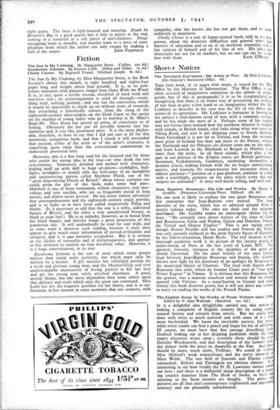Fiction
The Sun Is My Undoing, by Miss Marguerite Steen, is the Book Society's choice this month, is eight hundred and eighty-four pages long and weighs about four pounds. It is, as its pub- lishers announce with pleasure, longer than Gone With the Wind. It is, in fact, quite a terrific set-out, chockfull of hard work and narrative zest • its picturesqueness is solid all through—every- thing built, nothing painted ; and one has the conviction, which it would be impossible to check up on without years of research, that everything is historically correct, from the slang of the eighteenth-century slave-traders on the Gold Coast to the sprigs on the muslin of young ladies who go to worship at St. Mary's Redcliffe. Miss Steen has spared no pains, of conscience or of feeling. Obviously she has put all possible honesty into her immense and, if you like, passionate story. It is the more deplor- able, therefore, to have to say that I did not care at all for this enormous, scrupulous book, and that I closed it still persuaded that passion, either of the artist or of the artist's creatures, is something quite other than the conventional commotions so elaborately presented here.
However, this is a fine long read for the leisured and for those who prefer the strong idea to the true—or who think the two synonymous. Immensely detailed and packed with characters, leading itself up with skill to huge set-pieces—cockfights, bull- fights, lovefights—it mainly tells the love-story of an incredible and uninteresting person called Matthew Flood, one of the " great ship-owning Floods of Bristol," about whose surname one could, given the plot of this book, make some bad puns. Matthew is one of those tormented, violent characters, very mar- vellous and very terrible, who are so frequently stated in long novels, and almost never proved. He has every violent adventure that unscrupulousness and the eighteenth century could provide, and is so lucky as to have loves called respectively Pallas and Sheba. (Is it necessary to add that the one is a witty, cultivated beauty of Bristol, and the other a very uncultivated beauty, as black as your hat?) He is so unlucky, however, as to breed from the black beauty, and thereby hangs a great proportion of this ponderous tale. It will undoubtedly be read far and wide, and in some ways it deserves such reading, because it truly does appear to give much exact information of period-civilisation and savagery, and it is qua narrative scrupulous. But it is written in the clichés of sensuality and of picturesqueness, and appears to this reviewer to contain no true novelistic value. However, it is a huge entertainment, in its way.
Handsome Johnnie is the sort of story which many people believe they could write perfectly, but which must only be written by a master. A girl narrates her schoolgirl passion for a weak and glorious young man, and the Machiavellian and very understandable manoeuvres of loving parents to kill her love and get the young man safely attached elsewhere. A good, eternal theme, but one more dependent than some others upon that delicacy and truth which only the great can command. Miss Lobb has not the requisite qualities for her theme, and is so un- fortunate in her manner at some moments that one suspects, with
sympathy, that she knows she has not got them, and so toms recklessly to smartness.
Cholly Clover is a sort of funny-cynical book, told in the first person, about the domestic difficulties and general views and theories of education and so on of an insolvent journalist with a fair opinion of himself and of his line of wit. His jokes and wisecracks are not for all markets, but no one can say he is not


























 Previous page
Previous page